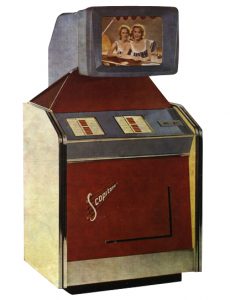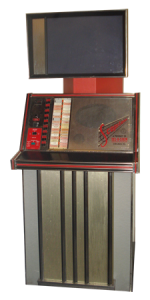In 1963, George Wood a theatrical agent with William Morris started a development deal to license Scopitone machines in the U.S. The arrangement was that the Wood’s friends would own and distribute the Scopitone and the William Morris agency would take 10% of the costs of every Scopitone film made to play on the new device. Wood worked out an arrangement with Abe Green the New Jersey jukebox distributor (Runyon Sales) to handle the distribution for Scopitone. In return Green and his silent partner, Geraldo Catena would have approval on all the other participants in the deal.
The first Scopitones in America, installed in “high-class” cocktail lounges, nightclubs, hotels, motels and restaurants, at first served as a novelty, exhibiting films of French pop singers unfamiliar outside Europe. The foreign-made machines offered a choice of 36 selections for a quarter per play. But to have a viable future, the machines needed American content. Wood’s gambit was to rake a 10 percent production fee off of each film placed in the machines. Plans were made for new, upgraded Scopitones manufactured in the United States and to produce films for them featuring U.S. recording artists.
Then, in 1963, Miami Beach attorney, Alvin Malnik organized Scopitone, Inc. and formed a group to purchase the American distribution rights. Ownership of Scopitone, Inc. was evenly divided between Malnick and his associates and the Maurice Uchitel group. The Malnick associates were Vincent Alo, Danny Brown, Joe Cataldo, Aaron Weisberg, and Francis Breheny. The Uchitel group included Abe Green, Alfred Miniaci, and Irving Kaye.
The Tel-A-Sign Deal
The Scopitone deal was worth more than $1 million in hardware alone, with Scopitone Inc. agreeing to buy two hundred machines and manufacture at least fifty-two hundered more over the next 10 years. The Wood and the Morris office stood to get a commission of $12 per machine plus 10 percent of the $15 sales price of each color film sold to play on the machines.
Eight months later with almost 500 machines installed in locations throughout the northeast 80% of the stock of Scopitone was sold to Tel-A-Sign a Chicago based manufacturer of illuminated advertising signs. According to the Wall Street Journal in an article on April 26, 1996 investors such as Weisberg and Green traded an $8000 investment in Scopitone for stock in Tel-A-Sign worth $3.3 million.
Tel-A-Sign was a publically traded manufacturer of large illuminated plastic signs for service stations, markets and other businesses. When quietly the Genovese family essentially took it over in 1964 and became the exclusive maker of the American-model Scopitones.
The Pump
The firm began by delivering 500 of the new machines from its Chicago factory each month starting in January 1965, with a goal, announced in newspapers and trade publications, of producing 10,000 of the devices. A Scopitone was even reportedly installed at the White House. Scopitones were a hit for the most part among Americans from 1965 to 1966, as business owners reported steady profits. Lounges and clubs with the machines advertised them widely in newspapers to lure customers. As early as the summer of 1965, the machines were operating in 1,300 locations and the stock soared.
The Investigation
An SEC investigation in May 1966 began when the Commission received information that Vincent Alo and Gerado Catena had been the real parties in interest in Scopitone, Inc. and that these two had thereby come into undisclosed beneficial ownership of large blocks of Tel-A-Sign stock. The investigation revealed the following events that led up to the Tel-A-Sign stock transaction:
- On July 29, 1964, Miami Beach attorney Alvin Malnik, using powers of attorney executed by the Scopitone shareholders, transferred an eighty percent interest in the corporation to Tel-A-Sign for stock then worth $3.5 million. Instead of dividing these proceeds between himself and the Uchitel group, Malnik retained approximately nine-tenths of the Tel-A-Sign stock. Beyond this lopsided distribution of the Tel-A-Sign shares, Malnik proposed to keep the remaining twenty percent interest in Scopitone.
- The members of the Uchitel group objected strenuously to Malnik’s division of the sale proceeds, as might well have been expected. Green protested directly to Malnik, who told him to arrange a meeting of all members of the Uchitel group. The resulting conference, the first of two at the Warwick Hotel in the latter part of 1964, was attended by Green, Miniaci, and Kaye, representing the Uchitel interests, and by Vincent Alo, who represented Malnik and his associates. In the meeting Alo expressed the hope that a settlement could be reached without recourse to litigation, but insisted that Malnik had earned the lion’s share of the proceeds by dint of his greater efforts in promoting the Scopitone venture. The Uchitel group insisted on a division according to the respective shares held in Scopitone, Inc.
- The second conference at the Warwick was attended by Alo, Uchitel, Miniaci, and Kaye. Alo still pressed for a negotiated settlement but balked at the Uchitel group’s insistence on thirty-five percent of the proceeds. A settlement was eventually reached in April 1965 when the Uchitel group agreed to accept approximately twenty-five percent.
The Federal probe
Attorney General Robert Kennedy and the U.S. Justice Department knew all about the Malnik transaction from the start in 1964. The federal government launched a secret grand jury investigation into Malnik, Alo, Scopitone and Tele-A-Sign, and the Securities and Exchange Commission started its own probe.
In December of 1965, a federal grand jury convened to investigate Malnik and Alo in the Tele-A-Sign stock deal. Alo was called before the SEC to testify about his alleged hidden ownership in Tele-A-Sign. He pleaded memory lapses to 134 questions about Tele-A-Sign, Scopitone and the New York meetings. Both Malnik and Alo were indicted based on the SEC investigation. But federal prosecutors discovered the FBI had illegally wiretapped Malnik, a lawyer, back in 1963 and eventually dropped his charges in 1971. Alo wasn’t so lucky. In 1970, he was convicted of obstructing justice and giving false and evasive answers to the SEC, sentenced to five years in federal prison and released after serving three.
The Dump
Sources leaked news of the grand jury probe to the Wall Street Journal in April 1966. Just as Scopitone’s business was rising, distributors and stockholders jumped ship amid the revelations of Mob involvement. Although originally touted as a wild success, by 1967 it became evident that Scopitone was actually losing money hand over fist. By 1969, Scopitone had closed its doors for good and its stock was essentially worthless. With Scopitones demise the era of the audio-visual jukebox came to an end.
The Players
The Malnick Group
- Alvin Malnik was a young Miami Beach attorney, and the reported $2 million profit from the Scopitone deal made Malnik a young millionaire and introduced him to the entertainment world. From this venture, Malnik developed long-lasting business and personal relationships with several “Rat Pack” celebrities including Frank Sinatra and Dean Martin. Malnik and his friend, the late Jay Weiss, purchased and remodeled The Forge restaurant in Miami Beach in 1968. Forbes magazine reported In the 1960s, Miami lawyer Alvin Malnik set up the Bank of Commerce in the Bahamas. Mob money flowed into its secret numbered accounts by the hundreds of millions–(mob financier Meyer) Lansky money, most of it–and then out again into Tibor Rosenbaum’s International Credit Bank of Switzerland before returning to the United States for investment.
- Vincent “Jimmy Blue Eyes” Alo was an Italian-American son of Harlem, the Bronx and the Lower East Side, Alo was born on May 26, 1904, and grew up alongside some of organized crime’s legends: Charles “Lucky” Luciano and Lansky. Alo and Lansky became partners in the mid-1930s. Alo also was tied to the New York Mafia family of the late Vito Genovese — the Italian-born Mafia boss revered as the “boss of bosses.” Alo was business partner and confidant of Meyer Lansky, with whom he ran pre-World War II illegal gambling operations like the Colonial Inn and Greenacres — and casinos in Cuba. After Lansky passed away, Alo looked after his son, Buddy Lansky, born with cerebral palsy.
- Joe “the Wop” Cataldo was the owner of the Camelot Supper Club a famous wise-guy hangout in New York City. On July 7, 1963, a call was placed from Jack Ruby’s home telephone to Gloversville, New York. When the FBI investigated this call the Bureau found that the telephone number in Gloversville belonged to Joe “The Wop” Cataldo, who the Bureau described as “a top New York hoodlum.” A few days before the FBI traced the toll call, FBI informant number “KY-4003-C-TE” advised that Jack Ruby obtained talent for his Dallas club through Joe “The Wop” Cataldo during the late 1950’s. Jack Ruby went on to shoot Lee Harvey Oswald after the Kennedy assassination.
- Aaron Weisberg who in partnership with Meyer Lansky owned 20% and was the Treasurer of the Sands Casino in Las Vegas. Weisberg was forced to testify (reluctantly) in the tax-evasion case of notorious mobster Joseph (Doc) Stacher.
- Francis “The Irishman” Breheney who was in the jukebox business in New York.
- Danny Brown was a notorious New York loan shark.
The Uchitel Group:
- Maurice Uchitel made uniforms for the U.S. Army during World War II and ran a business that produced coat fronts and suit shoulder pads. He became known as the “Shoulder Pad King” for helping to popularize the style of that era and was wealthy by age 30. Uchitel then invested in the hotel and restaurant industry, purchasing New York’s Voisin restaurant and the El Morocco and the Eden Roc in Miami Beach and the Place for Steak in North Dade, Florida.
- Alfred Miniaci of Paramount Vending a 30-year veteran of the coin-machine business, whose claim to fame was hosting the dinner for Frank Costello at which a hitman tried to kill the don. In New York during the 1950s, Alfred Miniaci’s jukebox business paved the road to success for singers Frank Sinatra, Dean Martin and Tony Bennett to name a few.
- Abe Green who with silent partner Gerardo Catena a New York mobster and a top member of the Genovese crime family owned a New Jersey jukebox manufacturing and distribution company Runyon Sales.
- Irving Kaye owner of a coin-op manufacturing company Irving Kaye Co. Inc. who according to FBI files got his start in the coin-op business as a soldier for Abner “Longy” Zwillman. (Zwillman was one of Newark NJ’s most notorious gangsters of the Prohibition era and one of the organizers and founding members of the National Crime Syndicate and Murder Incorporated.) Kaye was also reported to be a silent partner with Gerardo Catena.

